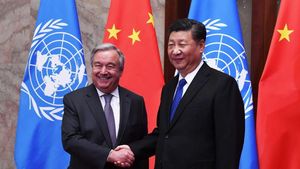Washington D.C. has once again shifted its political dynamics as Senate Republicans have officially selected John Thune of South Dakota as their new Senate majority leader. Thune's election follows the Republican party's victory on Election Day, seizing control of the chamber from Democrats. For decades, this leadership role has been rarely contested, and this time, Thune faced off against notable senators, including John Cornyn from Texas and Rick Scott from Florida.
During this pivotal moment, the three senators showcased their distinct approaches and aspirations for guiding the Republican agenda, especially as former President Donald Trump prepares for his return to the political forefront. The recent leadership election is significant not just for its outcome but for highlighting the divisions and ambitions within the party.
Thune, who is 63 years old, has had his eyes on this leadership position for some time. Having previously held the role of the No. 2 Republican senator and stepping up to lead briefly during Mitch McConnell's medical leave, Thune emerged as the frontrunner. He has built considerable rapport among his colleagues, with extensive experience as the chair of the Senate Commerce Committee.
On Election Day, Thune demonstrated his commitment to the party’s success by raising over $31 million to support Republican candidates—a clear indication of his political influence. Despite some past tensions with Trump—stemming from Thune's criticisms of Trump's attempts to overturn the 2020 election—he has since repaired their relationship, reportedly engaging frequently with the former president during the campaign.
John Cornyn, 72, took a different approach to his candidacy. Much respected within the GOP ranks and known for his longstanding presence, Cornyn has spent over two decades cultivating relationships and building significant fundraising capabilities, claiming to have raised more than $400 million for his party's candidates. He was especially noted for his involvement after the tragic school shooting at Uvalde, where he led negotiations for gun control reforms.
Despite these accomplishments, Cornyn's past suggestions of caution with Trump and his bipartisan actions might limit his support among more conservative factions within the party.
Rick Scott has been the standout candidate for the more right-leaning members of the Republican Party. The 71-year-old former governor of Florida positioned himself as one of Trump's strongest allies, emphasizing his commitment to Trump's agenda. Scott's campaign focused on how closely aligned he is with Trump's policies and how he could be the best advocate for implementing them. He has created substantial momentum, especially after receiving endorsements from prominent figures such as Elon Musk.
Scott had gained 10 votes when he previously challenged McConnell for the leadership role back in 2022, which indicated his ability to rally some support. He, along with other conservative senators, called for more direct power for individual senators, distancing themselves from McConnell's centralized leadership style.
Mike Lee of Utah expressed gratitude for Thune's election, recognizing the need for reforms within the Senate. He argued these changes are necessary to empower senators and allow for greater participation. Lee had backed Scott but conveyed optimism about working with Thune as the new leader.
John Curtis, the newly-elected senator replacing Mitt Romney, echoed sentiments of unity, signaling his intention to avoid the infighting witnessed during his time in the House. Curtis emphasized the importance of focusing on key issues like inflation, energy costs, and holding China accountable—goals he's hoping to achieve under Thune's leadership.
Despite the secret ballot voting process where many senators did not publicly disclose their choices, the unity among Republican senators was palpable. Following the election, both Lee and Curtis congratulated Thune, who now faces the responsibility of leading the party and ensuring cohesion as they strive for their legislative goals.
Some party members, especially those aligned with Trump, have called for more transparency concerning voting within the caucus. High-profile names like Elon Musk have added their voices to this call, making demands for public votes to allow constituents to hold their representatives accountable.
Lastly, as attention shifts toward the 2024 presidential race, the consequences of the newly elected leadership will be closely monitored. Thune’s capability to navigate the party's ambitions alongside the views of Trump's supporters will shape not only the Senate's agenda but also the Republican strategies moving forward, potentially impacting the next pivotal election.



